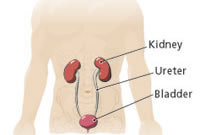Kidney Disorders
The kidneys are two small organs located behind the abdomen, on each side of the spine. By producing urine, kidneys remove toxic by-products and excess fluids from the body, which helps maintain a critical balance of salt, potassium and acid.
 Cancer that affects the kidneys can form in the small tubes inside the kidney, which are used for filtering blood, and in the center of the kidney where urine collects.
Cancer that affects the kidneys can form in the small tubes inside the kidney, which are used for filtering blood, and in the center of the kidney where urine collects.
Another common condition affecting the kidneys is ureteropelvic junction obstruction. Also known as UPJ, it involves blockage of the ureters, the tubes that transport urine from the kidneys to the bladder. These blockages can be present from birth or acquired through illness or injury, and can create serious side effects like infections and kidney stones. If left untreated, UPJ can cause chronic pain and may damage the kidney over time.
Treatment for Kidney Disorders
Non-cancerous kidney conditions usually can be treated by removing the blockages that cause them. Depending on the type of blockage, this may require surgery, called a pyeloplasty.
Kidney cancer is relatively resistant to radiation and chemotherapy. As a result, the gold standard treatment for localized kidney cancer is removal of the kidney or kidney tumors, called a nephrectomy.
Kidney surgery traditionally is performed using an open approach, which requires a large abdominal incision. Another approach, conventional laparoscopy, is less invasive but limits the doctor’s dexterity, visualization and control when compared to open surgery.
Robotic-Assisted Kidney Surgery: A Less Invasive Option
Robotic-assisted surgery is a less invasive alternative and potentially more effective alternative to laparoscopic and open kidney surgery.
Benefits of Robotic-Assisted Kidney Surgery
When performed robotically with the da Vinci Surgical System, kidney surgery is done with unparalleled precision and control through a few small incisions along the abdomen. It offers numerous potential benefits over other surgical methods, including:
- Significantly less pain
- Less blood loss
- Fewer transfusions
- Less risk of infection
- Less scarring
- Shorter hospital stay
- Shorter recovery time
- Increased potential for kidney preservation in certain prescribed cancer operations
- Better clinical outcomes, in many cases
As with any surgery, these benefits cannot be guaranteed, as surgery is both patient- and procedure-specific. While robotic-assisted kidney surgery is considered safe and effective, it may not be appropriate for every individual. Always ask your doctor about all treatment options, as well as their risks and benefits.
Illustrations courtesy of Intuitive Surgical, Inc.